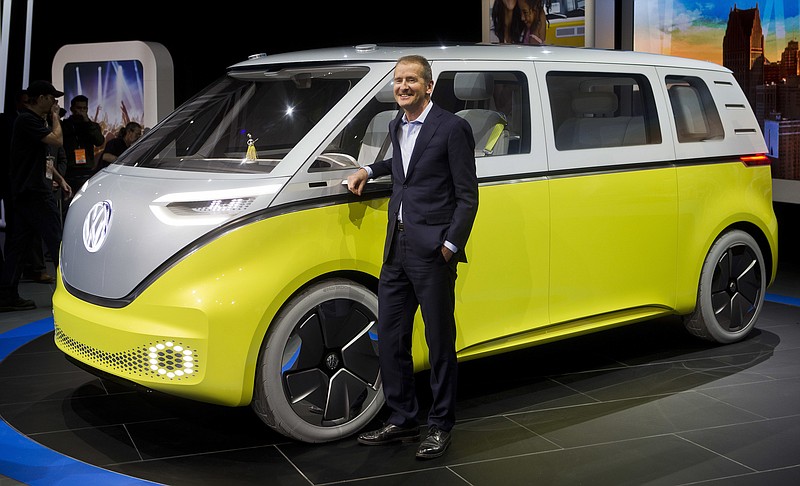VW delays intro of ID Buzz bus
The introduction of the Volkswagen ID Buzz, the fully electric microbus redux, is being delayed until 2023.
The modern take on the retro hippie-era van to be built in Hanover, Germany was originally scheduled to go on sale next year. But Scott Keogh, CEO of Volkswagen of America, told an Automotive News panel discussion this week that VW is pushing back the battery-powered microbus for another year because it must share capacity with a small electric commercial cargo van for Europe that has been deemed a priority.
The retro-styled, battery-powered van was first shown in 2017 at the Detroit Auto Show and had been promised for 2022 deliveries. The ID Buzz is being proceeded in European showrooms by a more conventional ID 3 electric hatchback, as well as the ID 4 crossover, a compact SUV that will be VW's first ground-up electric vehicle offered in North America.
Airlines ban guns on all D.C. flights
Delta Air Lines, United Airlines and American Airlines are banning firearms on flights to Washington, D.C. in the wake of last week's rioting at the U.S. Capitol and in preparation for the presidential inauguration next week.
The move by the three large U.S. airlines came as the Federal Aviation Administration said this week it will crack down more forcefully against disruptive passengers, citing growing incidents of "threatening or violent behavior" stemming from continued protests tied to masks and last November's elections.
The gun ban by Atlanta-based Delta applies to flights into Washington's Dulles and Reagan National, Baltimore-Washington International and Richmond International airports Jan. 16-23.
Firearms already are not allowed in carry-ons, and on those flights to the Washington, D.C. area, guns will not be allowed in checked bags on Delta either. Credentialed law enforcement are the exception.
Wholesale prices rise by most in six months
U.S. wholesale prices rose 0.3% in December led by a the biggest jump in energy costs since June.
The Labor Department reported Friday that the gain in its producer price index, which measures inflation pressures before they reach consumers, followed a modest 0.1% gain in November and matched the 0.3% rise in October.
The December increase reflected a 5.5% surge in energy costs, the biggest gain since a 9.6% jump in June. That offset a 0.1% drop in food costs, the first decline since August.
Gasoline prices rose 16.1% in December and accounted for nearly half of the increase in goods prices last month.
Over the past 12 months, inflation at the wholesale level has risen a modest 0.8%. The government reported Wednesday that consumer inflation was also well-behaved last year, rising just 1.4% over the past 12 months.
Industrial output up but below year ago
U.S. industrial production rose 1.6% in December, a third straight monthly gain, but remains below its pre-pandemic level.
The December gain in industrial output followed a 0.5% increase in November and a 1% increase in October, the Federal Reserve reported Friday. Even with those gains, industrial output is still about 3.3% below its level in February before the pandemic hit.
Manufacturing increased 0.9%, its eighth straight monthly gain, even as production of motor vehicles and parts declined 1.6%. That follows a string of gains for the auto sector, including last month's strong 5% increase. Without the drag in the auto sector last month, manufacturing posted gains of 1.1%.
Mining production rose 1.6%, while utilities' output rose 6.2% as a rebound in December demand followed a 4.2% decline in November due to unseasonably warm weather.
U.S. industry operated at 74.5% of capacity in December, still below the pre-pandemic rate of 76.9% in February.
While December's topline numbers were better than economists had expected, there is concern that rising coronavirus infections and a rocky vaccination campaign could further hamstring an already uneven recovery for the U.S. economy.
